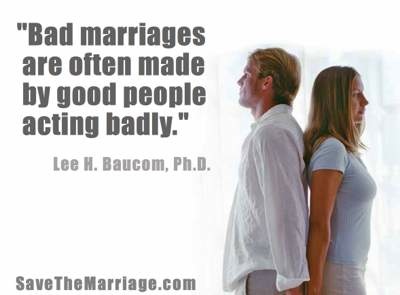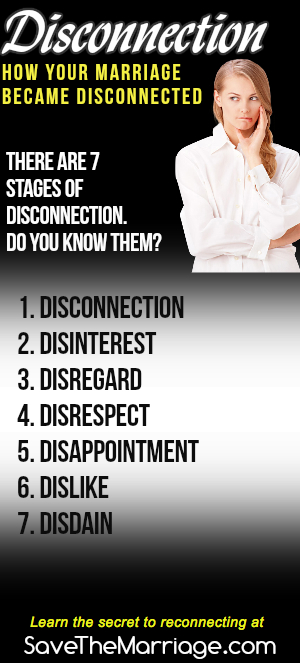“Sometimes It Just Sucks!”
https://savethemarriage.com/stmblog/wp-content/themes/corpus/images/empty/thumbnail.jpg 150 150 Lee H. Baucom, Ph.D. Lee H. Baucom, Ph.D. https://secure.gravatar.com/avatar/669b7e375d93f77521ddaba08adb8063?s=96&d=blank&r=pg“Linda” is a member of my virtual coaching program. She left me a message yesterday, “Sometimes, it just sucks.”
For the past four months, Linda had been working hard to save her marriage. Over the years, Linda and “Craig” had fallen out of step with each other. Maybe it was just those life events pulling at them: careers, kids, friends, other interests. Neither meant for it to happen. But it had. Linda and Craig were so disconnected that Linda found herself avoiding Craig, while Craig was doing the same.
 Between the two of them, their marriage had come unglued.
Between the two of them, their marriage had come unglued.
Every discussion led to an argument. Every argument led to the “silent treatment” by one or the other.
Sex, well. . . it seemed that “making love” was replaced with “making hate.” Then one day, even that stopped.
Their spiral was steep and fast. One day, over one glass of wine too many, Linda asked, “What are we doing? Where are we going?”
Craig responded. And Linda hadn’t expected his reply: “I’m about done here,” Craig stated. “I can’t live with the tension and disappointment. Every time I look at you, I see how you look at me. I feel horrible every day and every night.”
That night, Craig moved to the couch. He told his kids the next day, “I have allergies and have been keeping your mother up, snoring.” They had no reason to not believe him. Linda’s eyes were red and swollen. She cried and sobbed throughout the night.
For the next few days, the “silent treatment” became icy silence. They practically avoided each other.
But Linda couldn’t stand it any longer. “So what are we going to do?” plead Linda.
Craig said he was not sure. He just knew that things could not be like they were, and he didn’t think anything could change. Deep down, Linda feared the same thing. But she refused to face that.
She began to plead and beg. She tried to rationalize and argue. But after a couple of days of that, Craig was only more convinced of how bad things were — and more convinced that nothing could change. Linda realized she had to stop trying to convince him to stay.
For the next couple of weeks, Linda simply dragged through the day. She was barely able to move one foot in front of the other. Linda has told me that the only thing that kept her moving was her kids. She did not want them to see the pain and be scared.
One day, Linda woke up (and truly woke up). She decided this was not who she was, the situation was not what she wanted, and she was not going to give up. That is when Linda found me and my Save The Marriage System.
By that evening, Linda had digested lots of information and was ready to save her marriage. She changed how she interacted. She changed her arguing, stop trying to persuade, quit reacting to the “bait” Craig threw her way, and started looking for opportunities to connect.
Guess what happened?
Nothing.
Nada.
Zero.
Craig barely responded. He didn’t even seem to notice.
That could have been the end of the story. Linda could have given up. She could have walked away, and they could have started the legal process.
A few things kept Linda moving ahead. First, she came from a broken home and knew the pain. She did not want that for the kids. Second, Linda had made a decision that staying too long and trying too hard was better than giving up too soon. Linda had made a promise at her wedding. She wanted to keep it.
So, she kept at it.
And some days, it sucked.
Craig would tell her that nothing had changed (even though Linda knew she had changed). Craig would remind her that he believed that once love is gone, it is gone forever (strangely, as Linda worked on herself and he relationship, she began to feel a softening toward Craig — not quite love, but no longer was it hate). Craig stayed disconnected (in spite of Linda purposely trying to reconnect in ways Craig always wanted).
Some days, it sucked badly.
Linda wanted to give up.
One thing kept her going: she had committed herself to work as long as she could.
I told Linda something that changed her stance:
“Sometimes, bad marriages are made by good people acting badly toward each other.”
As much as Linda wanted to look at Craig as a bad person, she knew differently. She just needed a reminder. People do not always act as they should. They act out of their hurt — which feels like anger to the other person. Those moments of hurt and anger, though, are just desperate attempts to connect.
 I gave Linda some “tasks” to get through the tough times. So I thought I might share them with you.
I gave Linda some “tasks” to get through the tough times. So I thought I might share them with you.
1) Work to see your spouse through loving eyes. It is much too easy to only see your spouse through the hurt and pain. Through that lens, you will only see someone who may be: spiteful, vengeful, hurtful, angry, etc. But when you use loving eyes, you may see someone who is also hurting and unsure what to do, someone just as disillusioned and worried as you.
2) Make a list of the reasons why you want to work on the relationship. Write out as many as you can think of. You will come up with practical reasons: your finances, the kids, what others will think, and retirement. But you will also come up with some deeper reasons: belief in commitment, desire to learn and grow through a crisis, wanting to show your children how to move through struggles, and many others.
Mark out the practical ones. They may be important. But they will do little to inspire you. Keep a list of the deeper, soulful reasons. Pull them out and read through them when you are frustrated and feel like quitting. Your feelings can lead you away from your plans. As my wife says,
“Consult your plans, not your emotions.”
3) Accept that some days will suck. They just will. Sometimes, things will be moving forward. Then, you have a setback. It is easy to panic and decide to quit. Or you can just accept that is the nature of the process. Some days go great (don’t think you are in the clear), and some days will suck (don’t think this means it is all over). Keep it all in perspective. Enjoy the good days; endure the bad days.
Keep it all in perspective. Your marriage did not get into trouble overnight, and it will not improve overnight. The process can be slow and frustrating. But it is worth it in the end.
4) Take care of yourself. This is a stressful time. Your body is feeling it. Be sure and:
a) Eat well. Don’t get suckered into “comfort foods” that are full of carbs. The carbs turn to sugar and keep your body in “siege mode.”
b) Get some movement. I hate to call it exercise, but you need your body moving. 20 minutes of walking or even some short-duration, high-intensity activity (see the 7 Minute Workout) can help your body burn off the adrenaline load and help you maintain a good physical and mental frame.
c) Get your rest. Aim for 7 to 9 hours of sleep. Too little or too much is an indication and a cause of stress. Get your rest and you will have more resources for your efforts.
5) Take this time as a chance to grow. Read some books on self-development, listen to podcasts or audios (I have podcasts here and at my blog for self-development, Thriveology.com). There are so many resources out there. Feed your mind, your soul, your spirit. Take this difficult time as an opportunity to grow and discover what your challenge has to teach you.
Linda was right. Sometimes, it just sucks. But in the midst of the “suck-y,” you may discover lessons you need to learn and capacities you never knew you had. The effort, regardless of outcome, is what you can control.
Your intentions and actions are within your control. Circumstances and actions by others are not.









